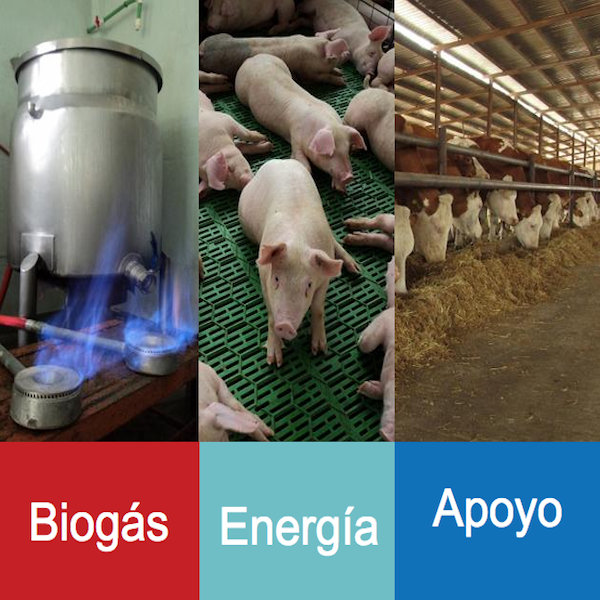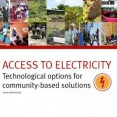This exchange activity aims to implement a collaborative process seeking to (i) consolidate the use of biodigester technology in Costa Rica and (ii) accelerate the adoption of biogas solutions by small and medium-scale livestock farmers in the country.
 The Costa Rican Biogas Association (Asobiogas) and WISIONS will jointly coordinate the implementation of a collaborative process seeking to (i) consolidate the use of biodigester technology in Costa Rica and (ii) accelerate the adoption of biogas solutions by small and medium-scale livestock farmers in the country.
The process integrates two work streams: the configuration and implementation of a SEPS knowledge exchange and the conceptualisation and realisation of a transdisciplinary transformative research approach. The collaborative process consists of six phases and continuously interweaves tasks and outputs of both the knowledge exchange and the research approach.
The Costa Rican Biogas Association (Asobiogas) and WISIONS will jointly coordinate the implementation of a collaborative process seeking to (i) consolidate the use of biodigester technology in Costa Rica and (ii) accelerate the adoption of biogas solutions by small and medium-scale livestock farmers in the country.
The process integrates two work streams: the configuration and implementation of a SEPS knowledge exchange and the conceptualisation and realisation of a transdisciplinary transformative research approach. The collaborative process consists of six phases and continuously interweaves tasks and outputs of both the knowledge exchange and the research approach.
- Phase 0: The main aim is to consolidate the transdisciplinary team who will coordinate the whole process.
- Phase 1: The central aim of this phase is to identify the variables that influence the implementation and adoption of small and medium-scale biogas technology in Costa Rica. A transdisciplinary approach known as case-based Mutual Learning Sessions (cbMLS) will be applied as the main strategy to advance that aim.
- Phase 2: The main aim is to ensure that substantial technical knowledge of biodigester technology is available to traditional providers of agricultural products and services in order that that they can offer biogas solutions as an alternative to other technologies and services. Strategies to advance this aim will be developed based on the knowledge produced and systematised in phase 1.
- Phase 3: This phase seeks to build awareness, interest and trust among small and medium-scale farmers in the benefits of biodigester technology and to forge greater levels of interaction between farmers and competent providers of biogas solutions, ultimately leading to increased demand from farmers for biogas technology. Strategies to advance this aim will be developed based on the results of phase 1.
- Phase 4: Phases 2 and 3 are expected to “ignite” the local market for biogas solutions. Phase 4 consists of monitoring and documenting the progress of the local market, as well as providing continuous support to all the parties involved in order to ensure robust consolidation of the sector.
- Phase 5: This phase consists of the co-evaluation and systematisation of the process. After a period of six months of continuous monitoring and support, the process and the results will be evaluated using a transdisciplinary approach. This approach will seek to extract lessons learned and recommendations that specifically address the individual stakeholders and organisations that can/should contribute to the future development of the sector in Costa Rica.
Access to Electricity 2010

The brochure focuses on technological options for community-based solutions related to ACCESS TO ELECTRICITY
Projects with same technology
Exchange: Community Trainers for Renewable Energy Technology Use in Sustainable Food Production and Water Management
The focus of this exchange activity is a social alliance and collective learning process between NGOs and rural communities from three regions of Colombia (Santander, Córdoba and Antioquia). It is based on the accumulated results achieved previously in a WISIONS supported project and ongoing community work in the field of renewable energy and sustainable livelihood strategies.
Exchange: Waste to Wisdom: Supporting Biodigester Practitioners in South East Asia
This knowledge exchange activity aims to address the technical gaps in organisations in Malaysia and the Philippines by providing them with the skills to install and operate biogas digester systems efficiently and affordably.
Projects in same country
Validating a Novel Approach to the Productive Use of Biogas to Empower Medium Scale Dairy and Pig Farmers in Costa Rica
This project aims to validate the feasibility of an innovative approach to the productive use of biogas in dairy and pig farms in Costa Rica, avoiding the use of electrical generators.